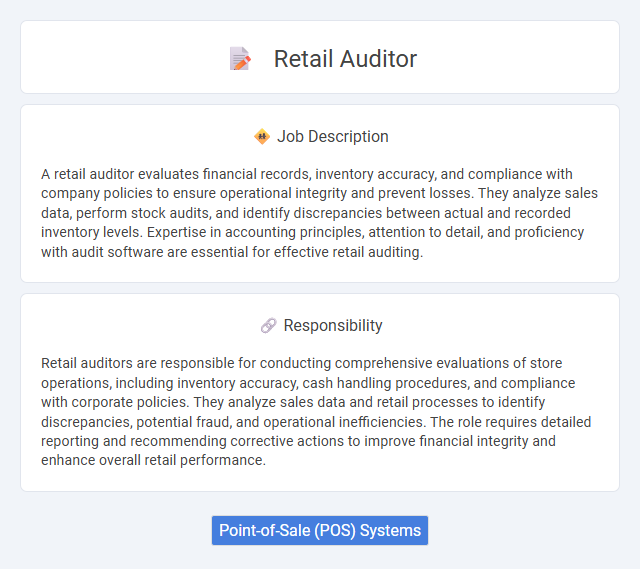
A retail auditor evaluates financial records, inventory accuracy, and compliance with company policies to ensure operational integrity and prevent losses. They analyze sales data, perform stock audits, and identify discrepancies between actual and recorded inventory levels. Expertise in accounting principles, attention to detail, and proficiency with audit software are essential for effective retail auditing.
People with strong attention to detail and a high level of integrity are likely to be well-suited for a retail auditor job. Those who can remain objective and handle repetitive tasks with accuracy might find this role fitting their skill set. Individuals uncomfortable with data analysis or strict compliance requirements may face challenges in adapting to the demands of this position.
Qualification
Retail auditor positions require a strong background in accounting, finance, or business administration, with most employers preferring candidates who hold a bachelor's degree in these fields. Proficiency in auditing software, data analysis tools, and knowledge of retail operations standards is essential for accurately assessing compliance and financial integrity. Certification such as CPA (Certified Public Accountant) or CIA (Certified Internal Auditor) significantly enhances the candidate's qualifications and career prospects.
Responsibility
Retail auditors are responsible for conducting comprehensive evaluations of store operations, including inventory accuracy, cash handling procedures, and compliance with corporate policies. They analyze sales data and retail processes to identify discrepancies, potential fraud, and operational inefficiencies. The role requires detailed reporting and recommending corrective actions to improve financial integrity and enhance overall retail performance.
Benefit
Retail auditor jobs likely offer benefits such as detailed insights into store performance and compliance, which can improve operational efficiency and reduce financial discrepancies. This role probably provides opportunities for career growth in retail management and finance sectors. Employees in this position may also enjoy a structured work environment with potential access to bonuses tied to audit accuracy and cost-saving measures.
Challenge
Retail auditor roles often involve the challenge of navigating vast, complex data sets to ensure accuracy and compliance with company standards. There is a high probability that auditors must adapt quickly to evolving retail environments and regulatory changes. Maintaining attention to detail under tight deadlines could frequently test an auditor's analytical and problem-solving skills.
Career Advancement
Retail auditor roles offer substantial opportunities for career advancement through skill development in financial analysis, compliance, and risk management within the retail sector. Mastery in auditing standards, data analytics, and regulatory frameworks enhances prospects for promotion to senior auditor, audit manager, or compliance officer positions. Professional certifications like CPA or CIA significantly improve advancement potential in the competitive retail auditing career path.
Key Terms
Point-of-Sale (POS) Systems
Retail auditors specializing in Point-of-Sale (POS) systems rigorously analyze transaction data to identify discrepancies, ensure compliance with financial regulations, and enhance inventory accuracy. They utilize audit software to track sales patterns, detect fraudulent activities, and validate pricing integrity across multiple retail locations. Expertise in POS technology and sales reporting analytics is essential for maintaining operational efficiency and improving profit margins in retail environments.
 kuljobs.com
kuljobs.com